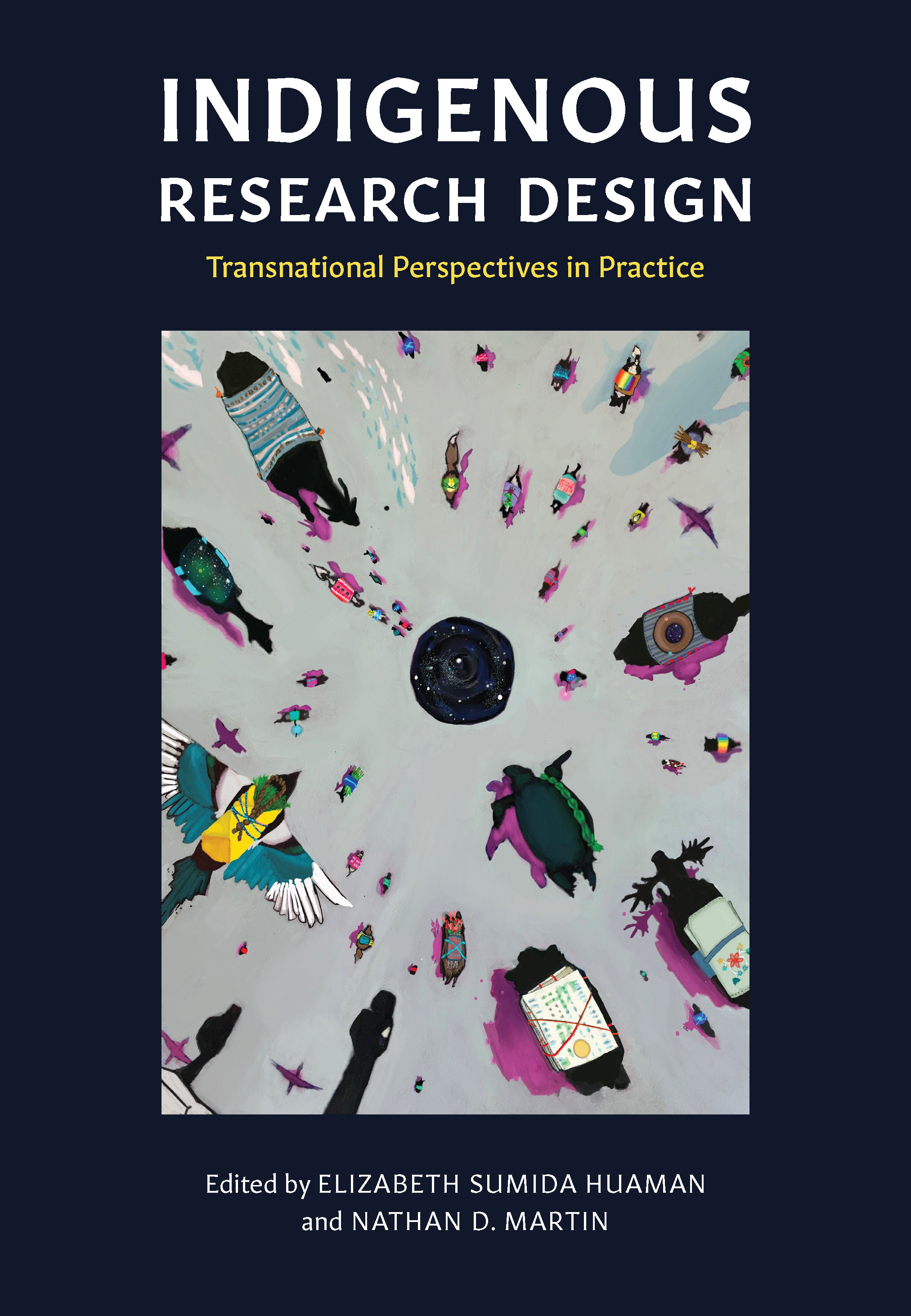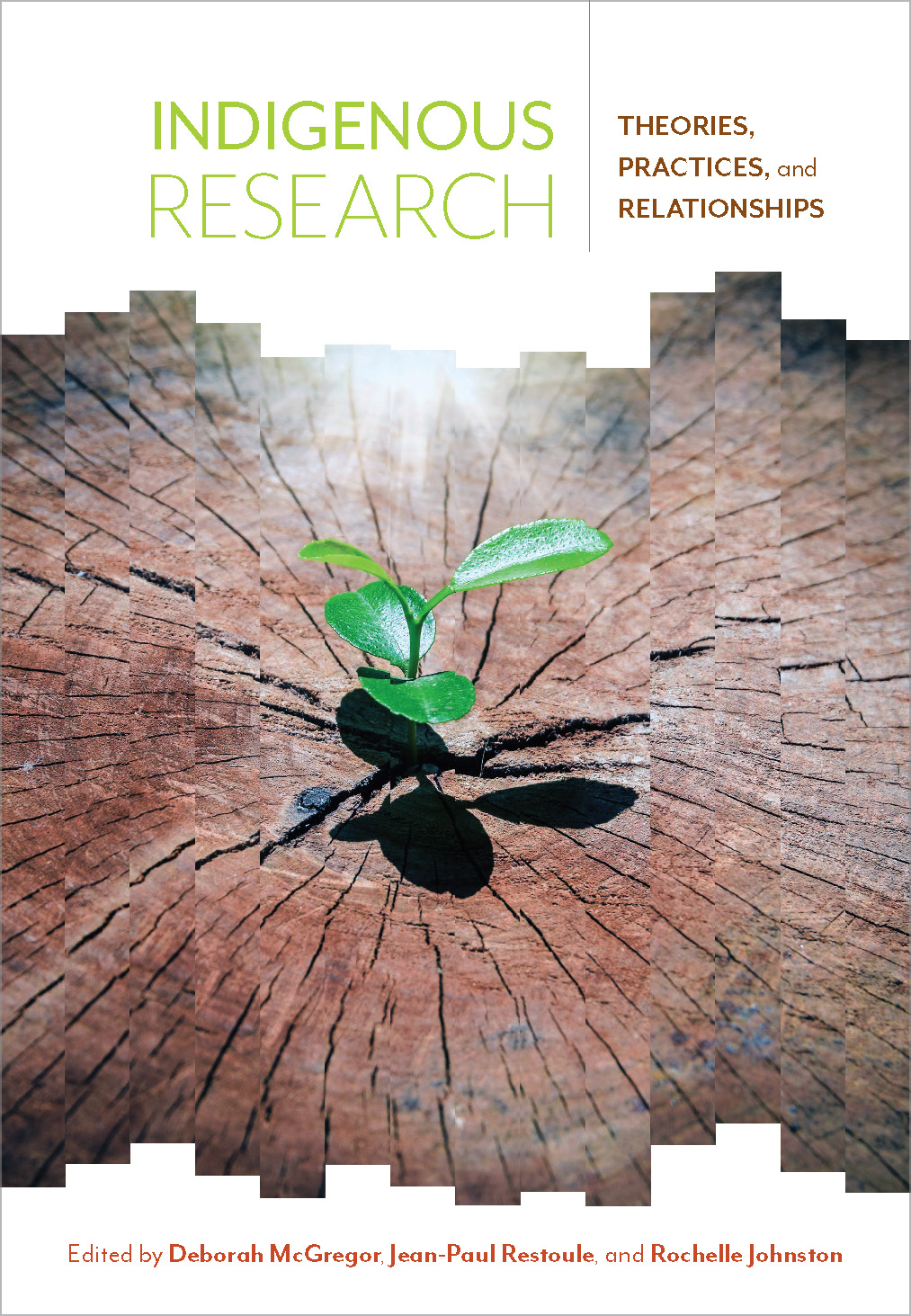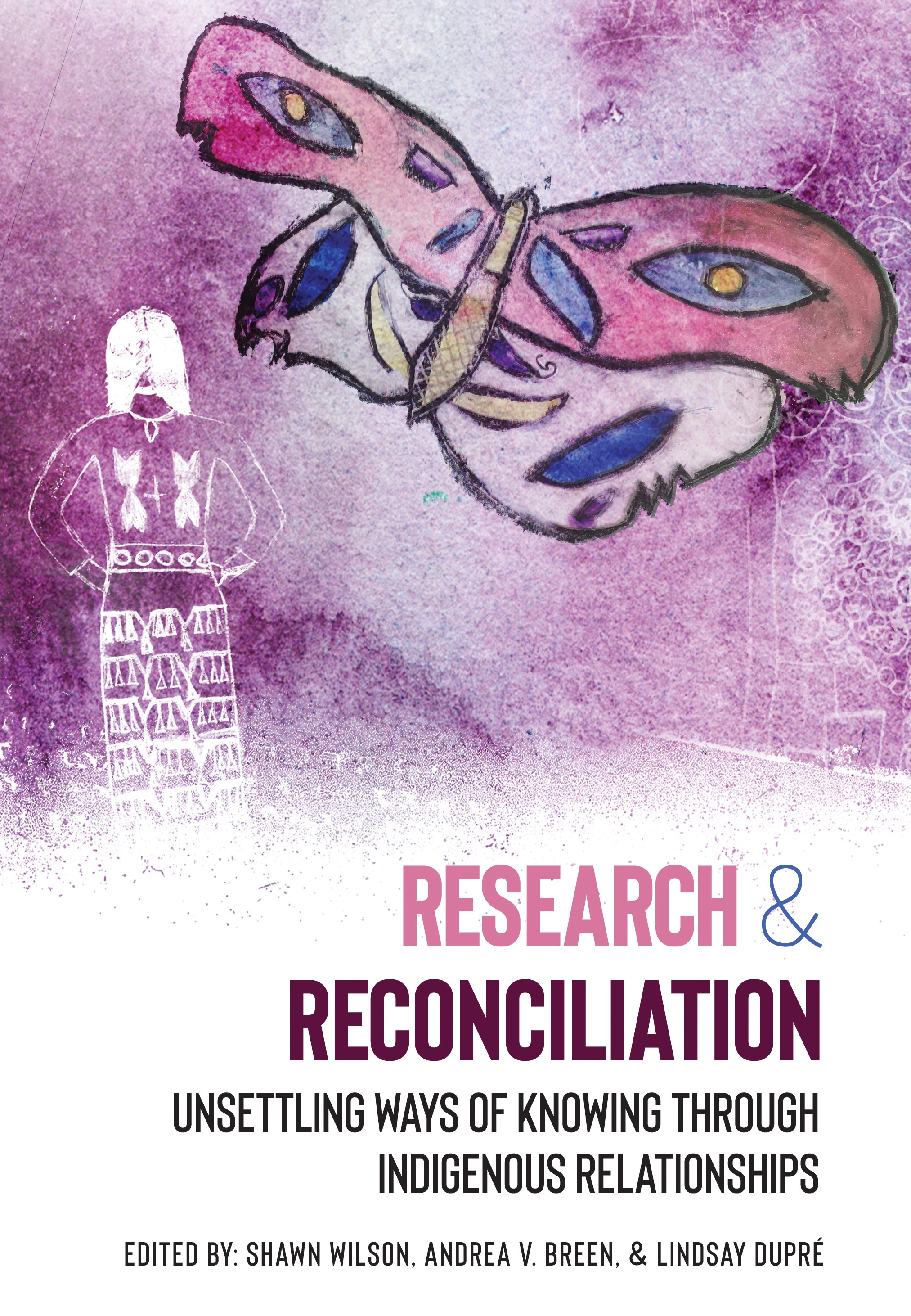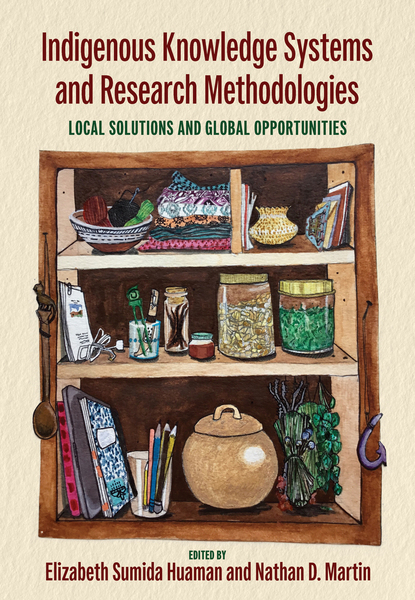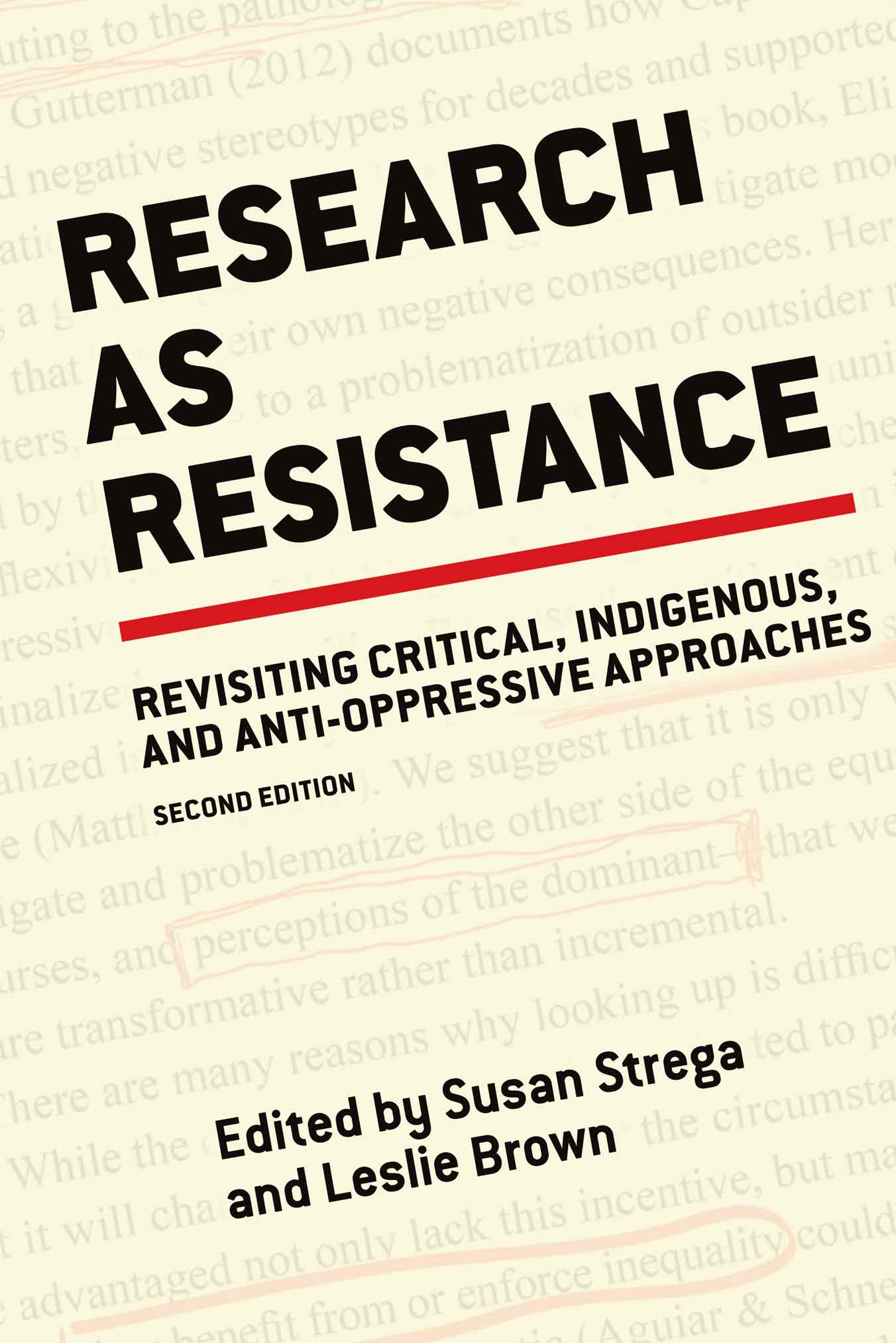Artist Statement Eliza Naranjo-Morse
Foreword Manulani Aluli Meyer
Part I – Indigenous Research Designs: Methodologies, Contexts, and Visions
Chapter 1 – Design for Life: Decoloniality and Research for Infinite Possibility
Elizabeth Sumida Huaman and Nathan D. Martin
Chapter 2 – On Reframing or Transcending Colonial and Other Patterns in Life
Pōkā Laenui, with Puanani Burgess
Chapter 3 – Shaping Research Preparation and Design Through Indigenous Storywork
Jo-Ann Archibald Q’um Q’um Xiiem and Sara Florence Davidson
Chapter 4 – Deciding in Relation with Community: An Indigenous Studies Critique of the Canadian Indigenous Methodologies Field
Chris Andersen and Chelsea Gabel
Part II – Research Questions: Origins of Thought, Epistemologies, and Purposes
Chapter 5 – Killing Kin/Haunting Life: Towards Indigenous Vocabularies of Loss and Repair
María Elena García
Chapter 6 – Re-imagining Two Laws within Indigenous Research: Truth Telling Beyond Australia’s Climate Crisis in South West Gulf Country, Northern Territory
Jason De Santolo and Gadrian Hoosan
Chapter 7 – Ngā hua o te wānanga: The Fruits of wānanga
Paula Toko King and Donna Cormack
Chapter 8 – Kakala Research Framework: a Garland in Celebration of a Decade of Re-educating, Reconceptualizing, Re-thinking, and Redesigning
Seu’ula Johansson-Fua
Part III – Research Lenses and Research Approaches: Relationships, Innovations, and De-linkings
Chapter 9 – Naagdowendiwin as a Methodological Approach to Research
Lorrilee McGregor and Susan Manitowabi
Chapter 10 – Māori Data is a Taonga
Karaitiana Taiuru
Chapter 11 – Pueblo Reclamation of Indigenous Research Design
Amanda J. Montoya and Rachell Tenorio
Chapter 12 – Indigeneity as Analytic: Recentring Ethnography through Indigenous Experience
M. Bianet Castellanos
Chapter 13 – Using A Guarani-Window to Decolonize Qualitative Research in Rural Paraguay
Melissa Ramos Vaesken
Part IV – Researcher Positionalities and Ethics: Ontologies Beyond Identity
Chapter 14 – Putting Research into the Heart: Relationality in Lakota-Based Research
Kaylen J. James, with Kellyn J. James
Chapter 15 – Walking in My Mother’s Footsteps: Nêhiýaw Resurgence Research
Linda Diffey
Chapter 16 – Afrocentric Research Ethics: Decolonial Possibilities for Indigenous Research and Research Design
C.M. Cyprian
Chapter 17 – Confronting Academic Colonialism: Reflections on my Role as an Ainu Researcher
Kanako Uzawa
Part V– Research Partnerships and Research Applications: Holographic Epistemologies and Pluriversalities
Chapter 18 – Marriage of Emancipation by Turning to the Tindanam: Research that Moves with the Movement in Indigenous Resistance to Large-Scale Mining in Upper East Region of Ghana
Coleman Agyeyomah and Jonathan Langdon
Chapter 19 – Engaged Ethnographic Research with Indigenous Communities: Insights from a Language Policy Study in Nepal
Prem Phyak
Chapter 20 – Tribal-University Partnership Methodology for Re-Searching with Manoomin/Psiŋ
Madeline Nyblade, Joe Graveen, Melonee Montano, Bazile Panek, and Hannah Jo King
Chapter 21 – Full Scientific and Indigenous Rigor: Lessons from a COVID-19 Vaccine Trial with Two Tribal Nations
Dakotah Lane, Tahnee Kawakone, Katrina Rodriguez, R. Scott McClelland, and William L. Freeman
Chapter 22 – “You Walk with People, Not Above, Not Below, with Them”: Designing Indigenous Teacher Research for Tribal Nation Building
Vanessa Anthony-Stevens, Iva Moss, Shawna Campbell-Daniels, and Angela Como Jacobson
Epilogue Elizabeth Sumida Huaman with Nathan D. Martin
Contributing Author Bios
Coleman Agyeyomah is the Executive Director of Innovation Development Alternatives (IDEAs), a development and organizational change NGO. He holds a MA in Development Studies (University of Leeds, UK). He consults on projects/programmes supported by Global Affairs Canada, World Bank, Danish International development Agency and UNICEF. He also teaches for Trent and St. Francis Xavier Universities.
Dr. Chris Andersen is the Dean of the Faculty of Native Studies and Special Advisor to the Office of the Provost on Leadership and EDI at the University of Alberta. He is the author of two books including, with Maggie Walter, Indigenous Statistics: A Quantitative Indigenous Methodology (2013) and “Métis”: Race, Recognition and the Struggle for Indigenous Peoplehood (2014).
Dr. Vanessa E. Anthony-Stevens is an Associate Professor of social and cultural studies in the Department of Curriculum and Instruction, University of Idaho. Her research and practice critically examine the intersections of identity, language, and power in learning and schooling. She is married to Dr. Philip Stevens with whom she mothers two daughters.
Dr. Jo-ann Archibald Q’um Q’um Xiiem, a member of the Stó:lō Nation, with kinship in St’at’imc First Nation in British Columbia, is Professor Emeritus at the University of British Columba. Her scholarship relates to Indigenous knowledge systems, Indigenous Storywork, Indigenous teacher and graduate education, and Indigenous methodologies and pedagogies.
C.M. Cyprian (M.B.A.; B.S.) is a doctoral student at the University of Minnesota – Twin Cities. Their research explores Indigenous ways of being and knowing from the African Diaspora, specifically in cultural healing and spirituality, and its opportunities for application in organizational development and educational leadership.
Jason De Santolo is Garrwa and Barunggam and Professor of First Nations Land Justice in Jumbunna Institute for Indigenous Education and Research and Assoc. Dean (Indigenous Research) at UTS. He has worked in higher education for over two decades, combining legal training with creative methodologies to further Indigenous rights and environmental justice.
Dr. Linda Diffey, a member of the Peepeekisis Cree Nation, co-led the creation of Indigenous Health curriculum in undergraduate medical education and launched the BRAID Network, which supports faculty development in anti-racism and Indigenous health. Her research investigates anti-colonial, anti-racist pedagogy in medical education and systemic colonial oppression in health-related institutions. She also explores Indigenous research methodology and the application of Indigenous resurgence.
Dr. William L. Freeman’s entire 51-year medical career has been working with and learning from
U.S. Indigenous Tribes and communities, first as a physician in Indian Health Service (25 years), now for Tribes or Northwest Indian College (26 years). He continues to learn how to assist Tribal-led health research and Tribal-based Institutional Review Boards that honor Tribal sovereignty and self-determination.
Dr. Seu’ula Johansson-Fua, is Tongan and lives on the main island of Tongatapu with her family. She was educated in New Zealand and in Canada. She is the Director of the Institute of Education at the University of the South Pacific, serving 12 Pacific countries that own the university.
Dr. Chelsea Gabel is Métis from Rivers, Manitoba, and a citizen of the Manitoba Métis Federation. She is an Associate Professor in the Department of Health, Aging and Society and the Indigenous Studies Department at McMaster University in Hamilton, Ontario, Canada. She also holds a Canada Research Chair in Indigenous Well-Being, Community Engagement and Innovation.
Dr. María Elena García is a Peruvian woman of Quechua ancestry, and a Professor in the Comparative History of Ideas at the University of Washington. Most recently, she is the author of Gastropolitics and the Specter of Race: Stories of Capital, Culture, and Coloniality in Peru (University of California Press 2021).
Joe Graveen is a hunter-gatherer and enrolled tribal member of Lac du Flambeau Band of Lake Superior Ojibwe (LDF). He is also the LDF Wild Rice program manager in the Tribal Natural Resource Department. He was born and raised on the Lac Du Flambeau Reservation. He has 4 children and 2 grandchildren.
Angela Como Jacobson serves as program manager for the Indigenous Knowledge for Effective Education Program and Cultivating Relationships at the University of Idaho, where she earned her Master of Natural Resources. Her research interests focus on land- and place-based creative writing curriculum. Angela is married and has one daughter.
Hannah Jo King is PhD candidate in Natural Resources Science and Management at the University of Minnesota-Twin Cities. Their research focuses on land and environmental justice, Black ecologies, tribal natural resources management, and community engagement. They utilize interdisciplinary research tools such as interviewing, archival research, and digital storytelling.
Dr. Paula Thérèse Toko King (Te Aupōuri, Te Rarawa, Ngāpuhi, Ngāti Whātua, Waikato Tainui, Ngāti Maniapoto) is a public health medicine specialist and Kaupapa Māori researcher focusing on tāngata whenua/sovereign rights to wellbeing for mokopuna Māori (Māori babies, children and young people) and ethical co-designing with Indigenous Peoples.
Pōkā Laenui (Hayden Burgess) is married to Puanani Burgess. Pōkā passed the Hawaii bar in 1976, recently recognized as one of the 100 best lawyers in the U.S. as well as Marquis’ Who’s Who Preeminent Achiever’s Awardee, with other recognitions in International Law. He has been recognized as a pioneer in international indigenous rights at the U.N. General Assembly, and for his community work in behavioral health. He is regarded as the father of the modern Hawaiian sovereignty movement. Puanani is a community organizer, a poet, a story-teller, and a consultant to many organizations across the United States. A Hawaii living treasure, she teaches of the beloved communities across schools, universities, boardrooms, and government departments through simple discussions and analysis. She is a respected Rinzai Buddhist priest of Dai Honzan Chozen Gi in Honolulu. Much of their works can be found at www.hawaiianperspectives.org.
Dr. Jonathan Langdon works with social movements in Ghana, South Africa, and Nova Scotia. He is the author of African Social Movement Learning (Brill, 2020), and editor of Indigenous Knowledges, Development and Education (Sense, 2009). He is a Professor and the Canada Research Chair for Sustainability and Social Change Leadership at St Francis Xavier University.
Dr. Scott McClelland is a Professor of Medicine in the Division of Allergy and Infectious Disease at the University of Washington. During the COVID-19 pandemic, he had the honor of working with the Lummi Nation and the Nooksack Indian Tribe in implementation of the Novavax Phase 3 COVID-19 vaccine trial.
Dr. Lorrilee McGregor is an Anishinaabe-kwe from Whitefish River First Nation. Dr. McGregor is an Assistant Professor at NOSM University in Sudbury, Ontario where she teaches about Indigenous peoples’ health. She is the Chair of the Manitoulin Anishinaabek Research Review Committee that serves seven First Nation communities on Manitoulin Island.
Nisogaabokwe – Melonee Montano, an enrolled member of the Red Cliff Band of Lake Superior Chippewa, is the Traditional Ecological Knowledge Outreach Specialist for Great Lakes Indian Fish & Wildlife Commission (GLIFWC). She also holds a B.S. degree from Northland College and is a Grad Student at the University of Minnesota in the Natural Resources Science & Management Program.
Dr. Amanda Montoya is from the Pueblos of Taos, Ohkay Owingeh and Isleta. Currently, she is the Executive Director for the Chamiza Foundation. She previously held positions as Community Development Planner for Taos Pueblo, American Indian Tourism Specialist for the New Mexico Tourism Department and Program Manager for the Indigenous Design and Planning Institute at the University of New Mexico. She graduated from Arizona State University with her Ph.D. in Justice Studies as part of the Pueblo Ph.D. Cohort Program.
Iva Moss is Northern Arapaho from the Wind River Reservation located in Wyoming. Iva is currently a PhD candidate at the University of Idaho, Vanessa Anthony- Stevens as Chair. Iva’s research is indigenous Knowledge Systems and STEM. Iva is married, a mother to two daughters and a son, and has two grandchildren.
Madeline Nyblade is a PhD candidate at the University of Minnesota-Twin Cities in Earth & Environmental Science and American Indian & Indigenous Studies. Her research focuses on tribal-university collaboration and climate and land-use change impacts, restoration, and justice.
Bazile Panek is a member of the Red Cliff Band of Ojibwe. He graduated from Northern Michigan University with B.S. Native American Studies. Bazile is an Indigenous Consultant for the Institute for Tribal Environmental Professionals. His philosophy is “honor my ancestors by becoming an honorable ancestor for future generations.”
Dr. Prem Phyak is an Associate Professor at the Teachers College Columbia University. His research interests include Language Policy, Indigenous Language Education, Multilingual Education, Social Justice and Decoloniality.
Dr. Kanako Uzawa is an Ainu scholar, artist, and rights advocate. She is a founder of AinuToday (AinuToday.com), a global online platform that delivers living Ainu culture and people. She is Assistant Professor for the Global Station for Indigenous Studies and Cultural Diversity at Hokkaido University in Japan. Her most recent work engages with the Ainu art exhibition as a guest curator in collaboration with the University of Michigan Museum of Art in the United States, as an associated researcher at the Museum of Cultural History at the University of Oslo in Norway, and as an editorial board member of AlterNative: An International Journal of Indigenous Peoples.
